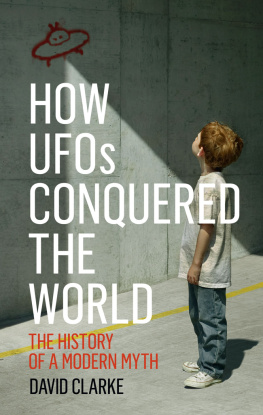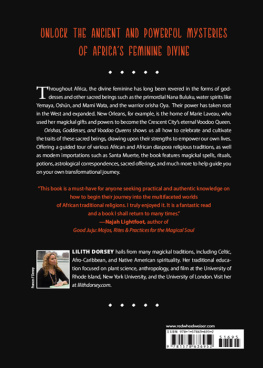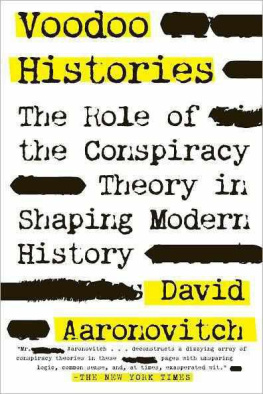Table of Contents
BY THE SAME AUTHOR
Paddling to Jerusalem
For Sarah, Rosa, Lily, Eve, and Ruby. My girls.
INTRODUCTION: BLAME KEVIN
This is the age of conspiracy, the age of connections, secret links, secret relationships.
DON DELILLO, RUNNING DOG (1978)
This book is the fault of a fellow named Kevin Jarvis. Kevin wasis, though I havent seen him since February 2002a tall, youngish man with a wicked grin and a shaved head. We had been sent by the BBC to Tunisia to make a short film for a program on holiday destinations in places that, away from the beaches and tourist sights, abused their citizens. Kevin was the cameraman-producer and I was what used to be called the lips.
All the filming had to be done secretly as Kevin and I moved between the mosaics of Carthage and the homes of tortured dissidents; otherwise we would have been arrested and quite possibly roughed up and deported. Several times we caught sight of the ubiquitous Tunisian secret police in their leather jackets and shades asterribly boredthey staked out the lives of opponents of the government.
It was, I think, in a rental car on the road down from Tunis to the Roman amphitheater at El-Jem (where I was to deliver one of those behind this attractive faade pieces to the camera) that Kevin told me about how the 1969 Apollo moon landing had been faked by NASA and the American government. This was a shock for me; unlike Kevin, I was old enough to have watched the One Small Step for Man on television, and it was part of my personal history, like Englands 1966 World Cup win. I wasnt anxious to lose it.
Kevins argument rested on one essential proposition: all the picture coverage of the landing, moving and still, was demonstrably fraudulent. There were things happening in the pictures that were impossible, and things not happening in them that certainly should have been. These phenomena included a flag that seemed to flutter in the nonexistent lunar breeze, an unnatural absence of stars, and a certain staginess about the movement of the astronauts. All of this was attested to by an army of photographic experts and scientists who had done years of research and whose conclusions were practically irrefutable. If the pictures were fake, then, it followed, the moon landings themselves must have been counterfeited.
My immediate reaction was one of skepticism. It wasnt that I was fore-armed with arguments to disprove his theory; it was just that it offended my sense of plausibility. My uncogitated objection ran something like this: a hoax on such a grand scale would necessarily involve hundreds if not thousands of participants. There would be those who had planned it all in some Washington office; those in NASA who had agreed; the astronauts themselves, who would have been required to continue with the hoax for their entire lives, afraid even of disclosing something to their most intimate friends at the most intimate moments; the set designers, the photographers, the props department, the security men, the navy people who pretended to fish the returning spacemen out of the ocean, and many, many more. It was pretty much impossible for such an operation to be mounted and kept secret, and inconceivable that anybody in power would actually take the risk that it might be blown. Given the imbalance in probabilities, I was therefore sure, without even scrutinizing it, that Kevins evidence was wrong. Besides, probably unknown to him, the entire thesis was familiar to moviegoers of a certain age: in 1978, the film Capricorn One had been based on a similar premise, except that time the earthbound crew had to be eliminated lest they tell the world about the non-landing. In that respect, at least the movie was more credible than the theory.
But the ball was already rolling. I became obsessed by conspiracy theories and what it was that made people believe them. Kevin was not some credulous blotter, absorbing any old liquid that his mind settled upon. He was a bright, well-educated, and commonsensical manyou could trust him when the Tunisian secret police were around. Whats more, hed probably have characterized himself, like me, as a skeptic. So why did someone like Kevin choose to believe, and argue for, a theory that was so preposterous? I wanted to understand what was going on, not least because, at the beginning of 2002, it wasnt just the events of 1969 that were under particular scrutiny. All sorts of conspiracy theories were springing up around the attack on the World Trade Center and the subsequent coalition invasion of Afghanistan, theories that seemed to me potentially dangerous in the worldview they expounded. As I researched, these theories didnt evaporate or appear purely marginal. Instead they seemed to become more insidious, more pervasive.
Conspiracy in the Bookshops
We in the West are currently going through a period of fashionable conspiracism. Books alleging secret plots appear on the current affairs and history shelves as though they were as scholarly or reliable as works by major historians or noted academics. Little distinction is made between a painstakingly constructed biography of John F. Kennedy and an expensive new tome arguingforty-three years after the eventthat the president was killed by the Mafia. Meanwhile, in music and DVD chains across the United States and Britain, among the limited number of books on sale, the young browser is likely to come across oversize paperbacks with titles such as Abuse Your Illusions, You Are Being Lied To, and Everything You Know Is Wrong: The Disinformation Guide to Secrets and Lies.
Checking in at a rather substantial thirty dollars each, these books consist of a series of bite-size essays by different authors dealing with myriad (and, frankly, random) subjects, from the oil industry to crime, via geopolitics. Their avowed purpose is to act as a battering ram against the distortions, myths and outright lies that have been shoved down our throats by the government, the media, corporations, organized religion, the scientific establishment and others who want to keep the truth from us.
Browsing through one of the books in the Disinformation series (published by the countercultural tycoon Richard Metzger), I came across a chapter titled The European Union Unmasked: Dictatorship Revealed. In it, a Lindsay Jenkinsformerly a civil servant in the British Ministry of Defensedetails the Eurocratic plot to destroy nation-states. At one point, Jenkins suggests that the encouragement of regionalism is part of this complicated conspiracy, the idea being to weaken Europeans and render them unable to resist the imposition of the superstate. So, she writes, insistence on the use of minority languages, especially in educating children, will ensure that the locality is isolated and will limit the opportunities for people in the wider world. It will make them second-class citizens and easier to control. All regional assemblies will have multiple translation services, which will further reduce their effectiveness. A theory that I suppose could be summed up as How the Welsh Destroyed the United Kingdom.
One recent book published in the popular Rough Guides series, listing some of the most significant conspiracy theories and tacitly accepting quite a few of them, even goes so far as to situate itself at a turning point in the Great Historiographical Debate. The idea, write the authors, that long ago it was great mens deeds that drove world affairs gave place to the notion that much bigger historical and social forces were at stake. Now, once again, it is being recognized that plans, projects conspiracies and even conspiracy theories can change the world.












